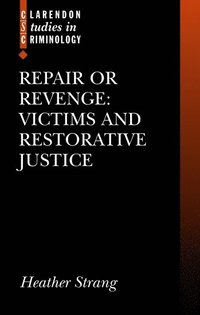
spara 65%
2 säljare
Repair or Revenge
This book addresses the role of victims in our criminal justice system and the shortcomings they perceive in the way they are treated. It examines whether restorative justice can offer them more justice than they receive from the formal court-based system. Research into the shortcomings of the court-based system has identified a number of issues that victims want to address. In brief, they want a less formal process where their views count, more information about both the processing and the outcome of their case, a greater opportunity for participation in the way their case is dealt with, fairer and more respectful treatment, and emotional as well as material restoration as an outcome. Over the past three decades, the victim movement worldwide has agitated for an enhanced role for victims in criminal justice. Despite some successes, it appears that structural as well as political factors may mean that victims have won as much as they are likely to gain from formal justice.A series of randomized controlled trials in Canberra, known as the Reintegrative Shaming Experiments (RISE), has provided an opportunity to compare rigorously the impact on victims of court-based justice with a restorative justice program known as conferencing. In these experiments, middle-range property and violent offences committed by young offenders were assigned either to court (as they would normally have been treated) or to a conference. Empirical evidence from RISE examined in this book suggests that the restorative alternative of conferencing more often than court has the capacity to give victims what they say they want in achieving meaningful victim participation and restoration, especially emotional restoration.
Utgiven: 2004
ISBN: 9780199274291
Förlag: OUP Oxford
Format: Häftad
Språk: Engelska
Sidor: 320 st
This book addresses the role of victims in our criminal justice system and the shortcomings they perceive in the way they are treated. It examines whether restorative justice can offer them more justice than they receive from the formal court-based system. Research into the shortcomings of the court-based system has identified a number of issues that victims want to address. In brief, they want a less formal process where their views count, more information about both the processing and the outcome of their case, a greater opportunity for participation in the way their case is dealt with, fairer and more respectful treatment, and emotional as well as material restoration as an outcome. Over the past three decades, the victim movement worldwide has agitated for an enhanced role for victims in criminal justice. Despite some successes, it appears that structural as well as political factors may mean that victims have won as much as they are likely to gain from formal justice.A series of randomized controlled trials in Canberra, known as the Reintegrative Shaming Experiments (RISE), has provided an opportunity to compare rigorously the impact on victims of court-based justice with a restorative justice program known as conferencing. In these experiments, middle-range property and violent offences committed by young offenders were assigned either to court (as they would normally have been treated) or to a conference. Empirical evidence from RISE examined in this book suggests that the restorative alternative of conferencing more often than court has the capacity to give victims what they say they want in achieving meaningful victim participation and restoration, especially emotional restoration.
Begagnad bok
200 kr564 krSpara 364 kr (65%) mot nypris
Fri frakt & skickas inom 1-3 vardagar
Köpskydd med Studentapan
Varje köp täcks av Studentapans köpskydd som säkerställer att boken kommer fram, att du får rätt bok och att skicket stämmer överens med beskrivning.



